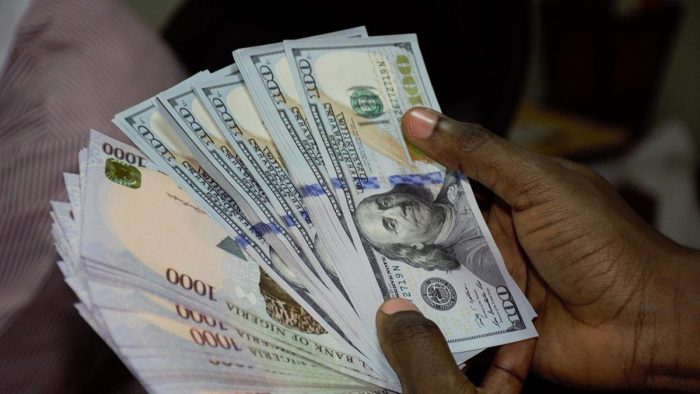The foreign exchange (FX) market closed the month of August on a negative note as the naira recorded a loss against the dollar across markets.
The naira ended the month at N1,598.56, losing N28.56 or 1.79 percent of its value against the dollar compared to N1,570/$1 quoted at the beginning of the month at the Nigerian Autonomous Foreign Exchange Market (NAFEM).
According to data compiled from the FMDQ Securities Exchange Limited, the dollar supplied by willing buyers and willing sellers increased in one month.
It rose by 21.42 percent to $172.80 million on Friday, the last trading day for August 2024, from $142.32 million recorded at the beginning of the month.
The naira lost 1.52 percent or N25/$1 as the dollar was quoted at N1,640 on Friday as against N1,615 quoted on the first trading day of August 2024, in the parallel market, popularly called black market.
On a day-on-day basis, the naira lost N10 to close at N1,640 per dollar from N1,630 closed on Thursday in the black market.
At NAFEM, the naira lost 0.29 percent (N4.63) day-on-day, as the dollar was quoted at N,1598.56 on Friday compared to N1,593.93 quoted on Thursday.
The daily FX turnover increased by 11.11 to $172.80 million on Friday from $155.52 million recorded on Thursday at NAFEM.
During the period under review, the Central Bank of Nigeria (CBN) resumed retail dollar sales through the retail Dutch auction system and sold over $1.7 billion in two auction days.
The CBN said during the period that it has reported a significant increase in remittance inflows of $553 million in July 2024.
This is a 130 per cent increase from the corresponding period in 2023, and represents the highest monthly total inflows on record yet.
The inflows reflect ongoing efforts by the CBN to enhance liquidity in Nigeria’s foreign exchange market, including policy measures to sanitise the market, instill transparency and boost confidence.
Those measures include: granting licenses to new International Money Transfer Operators (IMTOs), implementing a willing buyer-willing seller model, and enabling timely access to naira liquidity for IMTOs.
Diaspora remittances are a crucial source of foreign exchange for Nigeria, supplementing both foreign direct investment and portfolio investments.
“The CBN’s initiatives have supported continued growth in these inflows, aligning with the institution’s objective of doubling formal remittance receipts within a year,” Hakama Sidi Ali, CBN acting director, corporate communications, said in a statement.
“The increase in remittances is a strong testament to the success of the CBN’s ongoing efforts to bolster public confidence in the foreign exchange market, strengthen a robust and inclusive banking system, and promote price stability, which is essential for sustained economic growth.”
Join BusinessDay whatsapp Channel, to stay up to date
Open In Whatsapp





